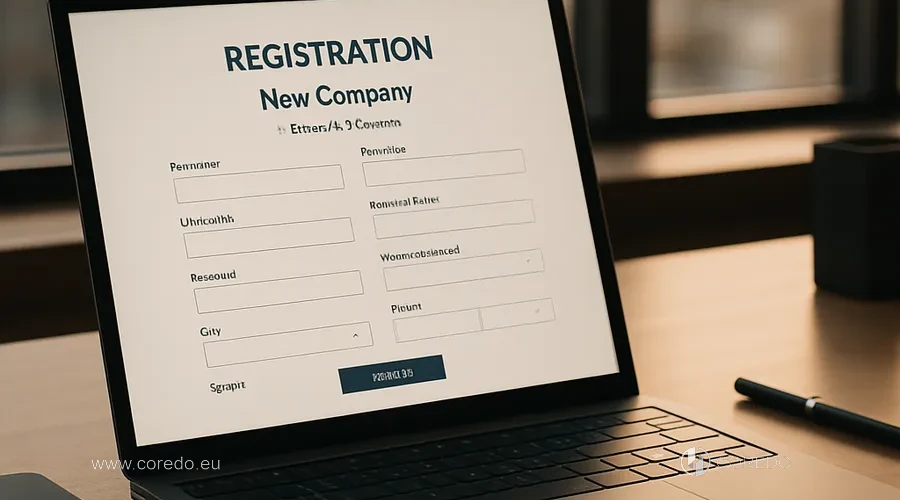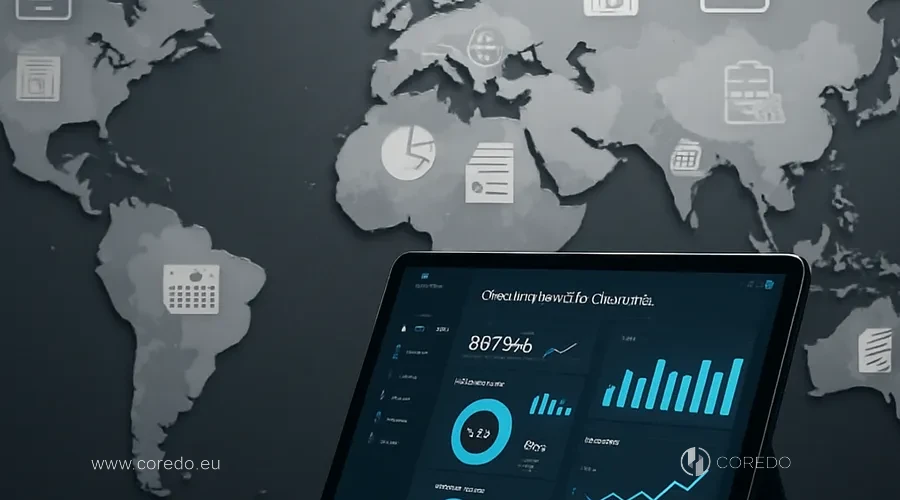Even more telling: according to the latest Statista report, the global turnover of the affiliate marketing market exceeded $17 billion, and more than 60% of companies operate through international structures. But why do so many entrepreneurs still waste time and resources on ineffective schemes?
How to choose a country to register an affiliate company with minimal taxes and maximum legality? Where is it easiest for a non-resident to open an account for an affiliate business? Which countries provide privacy and flexibility, and where can risks and compliance barriers “strangle” a project at launch?
If you want not only an overview of jurisdictions but also practical recommendations that actually work, be sure to read to the end.
Choosing a country for affiliate marketing: why it matters

In the world of affiliate marketing the corporate structure is not just a legal shell, but the foundation for tax optimization, access to payment systems and asset protection. In practice COREDO confirms: the choice of country affects not only the level of tax burden, but also the ability to legally scale traffic arbitrage, work with affiliate networks and ensure AML compliance/KYC requirements.
How to choose a jurisdiction for an affiliate business
COREDO’s experience shows that when choosing a country to register an affiliate company the following parameters are critical:
- Tax residency: Determines where your company will pay taxes and be subject to reporting. It is important to take into account CFC regulations and international agreements on the exchange of tax information (CRS, FATCA).
- Corporate mobility: The ability to manage remotely, e-residency, digital identification and company registration online for affiliate business.
- Ease of opening corporate accounts: For traffic arbitrage and working with international payment systems (Stripe, PayPal) rapid account opening for a non-resident affiliate company is critical.
- Privacy and publicity of the owners’ register: To protect the ultimate beneficial owner (UBO) and minimize reputational risks.
The impact of taxes and CFC on affiliate income
International taxation for affiliate companies: it’s not only the corporate tax rate but also principles of tax transparency, CFC (Controlled Foreign Corporation) rules and tax residency. For example, in Estonia corporate tax is levied only when profit is distributed (0% on reinvested profit, 20% when dividends are paid), while in the UAE corporate tax ranges from 0 to 9% depending on the zone and type of activity.
The solutions developed by COREDO allow clients to use tax incentives for IT companies, free zones and double taxation avoidance agreements. At the same time it is important to remember: excessive «offshoring» can lead to account blocks, refusal to work with payment gateways and increased scrutiny from tax authorities.
AML, KYC and banking compliance – risks and limitations
Since 2023 regulators in the EU, the UK and Singapore have tightened AML/KYC requirements for affiliate companies, especially when opening accounts for non-residents and working with international payment systems. COREDO’s experience shows: successful company registration for affiliate marketing is impossible without strict adherence to KYC, AML and banking compliance procedures.
Therefore when choosing a country to open a company it is important to assess not only tax but also compliance risks in advance.
Where to register an affiliate company: EU, Asia, UAE, Africa

International business registration for affiliate marketing requires an in-depth analysis not only of tax rates, but also of corporate reporting requirements, data protection, currency controls and the availability of banking services. The COREDO team has executed projects in more than 15 jurisdictions, which allows an objective comparison of their advantages and limitations.
EU: taxes and benefits for business
- Estonia: e-residency, the ability to register a company remotely, corporate tax 0% on undistributed profits, strict reporting requirements and GDPR. Opening a bank account for an affiliate company for a non-resident is challenging but solvable with digital identification and proper assistance.
- Malta: Attractive for iGaming licensing and affiliate projects, corporate tax from 5% (after tax refunds to shareholders), mandatory audit, well-developed intellectual property protection.
- United Kingdom: Corporate tax 19%, public register of owners, strict banking compliance, mandatory audit and reporting.
Business registration in Singapore and Hong Kong
- Singapore: Minimal share capital, territorial taxation principle (17% only on income from Singapore), no currency controls, high level of privacy and data protection. Company registration takes 3–7 days, at least one resident director is required. Opening a bank account for an affiliate company is possible, but banks require transparency of the structure and sources of income.
- Hong Kong: Corporate tax 8.25–16.5% only on income earned in Hong Kong, high level of privacy, no currency controls, ease of registration and remote management. Special attention is paid to intellectual property protection and compliance.
Preferential regimes and free zones in the UAE
- UAE: Corporate tax 0–9% depending on the free zone, no currency controls, possibility of 100% foreign ownership, ease of opening accounts. Requirements for founders and directors depend on the specific free zone, but often one shareholder and one director are sufficient. Free zones offer tax holidays, simplified reporting and a high level of privacy.
Africa: risks and opportunities for business
- Seychelles, Mauritius: Offshore regimes with corporate tax 0–15%, high level of corporate secrecy, no mandatory audit, but there are risks of currency controls and restrictions on working with international payment systems. For affiliate companies it is important to consider limitations on profit repatriation and licensing requirements.
Table of jurisdictions for affiliate business
| Jurisdiction | Corp. tax | AML/KYC | Account opening | Privacy | Audit/reporting | Free zones | Features |
|---|---|---|---|---|---|---|---|
| Estonia | 0%/20% | High | Difficult | Medium | Yes | No | e-Residency |
| Malta | 5-35% | High | Medium | Medium | Yes | No | iGaming licenses |
| United Kingdom | 19% | High | Difficult | Low | Yes | No | Public register |
| UAE | 0-9% | Medium | Easy | High | No (in free zone) | Yes | No profit tax |
| Singapore | 17% | High | Medium | High | Yes | No | No currency controls |
| Hong Kong | 8.25-16.5% | High | Medium | High | No | No | Tax only on income from HK |
| Africa (Seychelles, Mauritius) | 0-15% | Medium | Medium | High | No | Yes | Offshore regimes |
Company registration for affiliate marketing

COREDO’s experience shows: the success of registering a company for affiliate marketing depends not only on the choice of country, but also on strict compliance with procedures, requirements for founders, and proper preparation of documents.
Requirements for founders and directors by country
- Singapore and Estonia require at least one resident director; in the UAE and Malta 100% foreign ownership is allowed.
- The ultimate beneficial owner (UBO) must be disclosed in most jurisdictions, but the level of register publicity varies (for example, in the UK it’s public, in the UAE it’s confidential).
- To register a company online for an affiliate business in Estonia and Singapore, digital identification and address verification are required.
Registration: stages and documents
- Preparation of incorporation documents (articles of association, information about directors and shareholders, address verification).
- Submitting an application to register the company online or through a local agent.
- Receiving the certificate of incorporation and corporate documents.
- opening a bank account for an affiliate company by a non-resident (requires passing KYC and AML procedures).
- Obtaining licenses (if required) for marketing or financial services.
Due to the implementation of digital solutions, the next stage — opening a corporate account — requires separate attention, as it is associated with a number of specific challenges and nuances.
Opening a corporate account: challenges and tips
- In the EU and the UK, banks require a detailed business plan, proof of income sources, and a transparent UBO structure.
- In the UAE and Singapore, opening an account for an affiliate company is possible remotely, but success depends on the quality of the KYC package preparation.
- For working with payment gateways (Stripe, PayPal, Wise), it is important to choose jurisdictions that are not on the FATF ‘grey’ lists FATF and that support international payment systems.
AML, KYC and GDPR: what you need to know
- In the EU and the UK, strict KYC and AML rules apply to affiliate companies, as well as data protection requirements (GDPR).
- In Singapore and Hong Kong, the emphasis is on digital identification and transparency of sources of funds.
- In UAE free zones, a minimal set of documents is required, but banks conduct their own compliance checks.
COREDO’s AML consulting solutions enable clients to ensure full compliance with international standards and avoid account blocks.
Thus, approaches to AML, KYC and data protection vary greatly by region and affect the processes of opening and servicing accounts.
Taxes and Reporting for Affiliate Companies by Country

Effective tax optimization for affiliate companies is impossible without taking into account tax residency, CFC regulation, and the specifics of corporate reporting.
Tax residency and double taxation
- A company’s tax residency determines where it is obliged to pay taxes and file reports.
- To avoid double taxation, it is important to use DTA (Double Taxation Agreements) between the countries of registration and the markets of operation.
- COREDO’s experience shows: a well-designed structure using holding companies and free zones can minimize the tax burden and legally repatriate profits.
Corporate reporting and CFC audit
- In the EU and the UK, an audit and corporate reporting are mandatory, as well as disclosure of UBO information.
- In the UAE and certain free zones reporting is minimal, audits are not required, but banks may request financial documentation.
- CFC regulation requires owners of controlled foreign companies to disclose income and pay taxes in their country of tax residency.
Preferential tax regimes and free zones
- The UAE, Singapore, Malta and certain free zones offer tax incentives for IT companies and marketing services, including tax holidays and reduced rates.
- It is important to note: after the end of the preferential period, the company must switch to the standard tax regime.
Legal risks for affiliate companies

Legal support for affiliate business is the key to long-term stability and minimizing the risks of blocks, fines, and litigation.
Licenses and permits for business
- In the EU and Malta, for a number of marketing and financial services licensing is required.
- In the UAE and free zones obtaining a license is simplified, but to work with international partners it is important to comply with AML/KYC standards.
- COREDO’s solutions include an audit of the business model and preparation of a full package of permit documentation for affiliate companies.
Currency control and payment restrictions
- In some African and offshore jurisdictions there are restrictions on foreign exchange operations and repatriation of profits.
- Stripe, PayPal and other payment gateways do not work with companies from “gray” zones, which limits scaling opportunities.
- COREDO’s experience has shown: choosing a jurisdiction with a transparent currency regime and support for international payment systems is a critical success factor.
Protection of intellectual property and data
- In the EU and the UK, strict GDPR applies; in Asia and the UAE there are local data protection laws.
- intellectual property protection (brand, domains, content) requires registration of rights and monitoring of infringements.
- COREDO’s practice includes developing a data protection strategy and supporting procedures for registering IP rights.
How to choose a country to register an affiliate company
Choosing a country to register an affiliate company is a strategic process that requires taking into account tax, legal, and operational factors.
Choosing a business jurisdiction – checklist
| Criterion | EU (Estonia, Malta) | UAE (free zones) | Asia (Singapore, Hong Kong) | Africa (Seychelles, Mauritius) |
|---|---|---|---|---|
| Corporate tax | 0–20% | 0–9% | 8.25–17% | 0–15% |
| Account opening for non-residents | Difficult | Easy | Moderate | Moderate |
| AML/KYC | High | Medium | High | Medium |
| Owner privacy | Medium | High | High | High |
| Reporting requirements | Yes | No/minimal | Yes/no | No |
| E-residency availability | Yes (Estonia) | No | No | No |
| Licensing | Often | On request | On request | No |
| Stripe/PayPal support | Yes | Yes | Yes | Limited |
Examples of successful affiliate strategies
- To scale an affiliate business in the European and Asian markets, the COREDO team implemented a structure with a holding company in Estonia (e-residency), an operating company in the UAE (free zone), and bank accounts in Singapore and the United Kingdom. This allowed the client to minimize taxes, ensure the legality of the structure, and gain access to international payment systems.
- For traffic-arbitrage projects, registering a company in Singapore with subsequent opening of accounts in Asian and European banks proved effective, providing flexibility and speed in settlements with partner networks.
Recommendations for entrepreneurs
- Minimize taxes and risks: Use free zones, double taxation treaties, and preferential regimes for IT companies.
- Ensure legality and transparency of the structure: Disclose UBOs, automate corporate reporting, comply with CFC regulations.
- Choose a jurisdiction aligned with your scaling goals: For working with international partners and payment gateways, prioritize countries with developed banking infrastructure and support for digital identification.
- Prepare a complete set of documents for a quick launch: Incorporation documents, proof of address, business plan, KYC/AML package, licenses (if required).
Choosing a country for affiliate marketing
Where to open a company for affiliate marketing with minimal taxes? The most advantageous are UAE free zones, Estonia (when reinvesting profits), Malta (when reclaiming tax), Singapore and Hong Kong (territorial taxation).
Which jurisdictions provide maximum privacy for owners of affiliate businesses? UAE, Hong Kong, Singapore, African offshore jurisdictions (Seychelles, Mauritius), a high level of corporate secrecy, and minimal public disclosure of ownership registers.
How to open an account for an affiliate company in Europe or Asia? A prepared KYC/AML package, a transparent UBO structure, and a business plan are required. In Asia (Singapore, Hong Kong) and the UAE the process is simpler; in the EU and the UK it is more difficult but possible with proper support.
What are the requirements for founders when registering an affiliate company in the UAE? In most free zones one shareholder and one director are sufficient, 100% foreign ownership is allowed, and there are no residency requirements.
How to ensure AML/KYC compliance when working with international payments? Implement internal KYC/AML procedures, automate client verification, use solutions for digital identification, and regularly update your compliance policy.